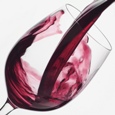
Study: Red Wine Antioxidant May Protect Against Radiation
Resveratrol, the natural antioxidant commonly found in red wine and many plants, may offer protection against radiation exposure, according to a study by the University of Pittsburgh School of Medicine. When altered with acetyl, resveratrol administered before radiation exposure proved to protect cells from radiation in mouse models. The results of the research were presented Tuesday at the American Society for Therapeutic Radiology and Oncology's (ASTRO) 50th Annual Meeting in Boston.
The study, led by Joel Greenberger, M.D., professor and chairman of the Department of Radiation Oncology at Pitt's School of Medicine, is overseen by the university's Center for Medical Countermeasures Against Radiation. The center, funded by a $10 million grant from the National Institute of Allergy and Infectious Diseases, is dedicated to identifying and developing small molecule radiation protectors and mitigators that easily can be accessed and administered in the event of a large-scale radiological or nuclear emergency.
"New, small molecules with radioprotective capacity will be required for treatment in case of radiation spills or even as countermeasures against radiological terrorism," Greenberger said. "Small molecules which can be easily stored, transported and administered are optimal for this, and so far acetylated resveratrol fits these requirements well."
Greenberger and his team are conducting further studies to determine whether acetylated resveratrol eventually can be translated into clinical use as a radioprotective agent. "Currently there are no drugs on the market that protect against or counteract radiation exposure," he said. "Our goal is to develop treatments for the general population that are effective and non-toxic."
In 2004, this same team of researchers identified the drug JP4-039, which can be delivered directly to the mitochondria, the energy producing areas of cells. When this occurs, the drug assists the mitochondria in combating radiation-induced cell death.